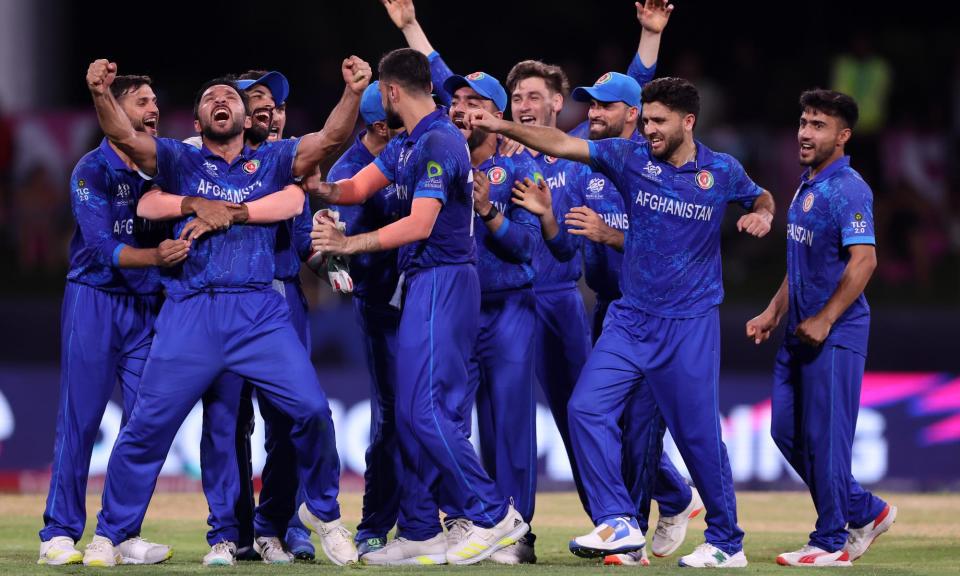Afghanistan’s magical rise continues with T20 World Cup giant slaying of Australia

In a sense, you felt the cricket gods owed Afghanistan one. In the T20 World Cup of November 2022, Rashid Khan blazed 48 at the end chasing Australia, but a couple of good slower balls saw him fall one boundary short. A year later in the one-day World Cup his team had the champions cold, seven down for 91 with 201 more to win. Problem being that Glenn Maxwell went on to make that many himself in one of the most extraordinary innings ever played. By the final few overs of that mad chase you could see Afghan players not so much wilting as melting into puddles on the grass, stop-motion plasticine men in blue.
Eight months later in the shortest format, they came back for another tilt and prospered, even surviving a test of nerve when Maxwell was playing another lone-hand marvel. Winning by 21 runs on the island of St Vincent leaves Australia’s T20 World Cup campaign at risk and Afghanistan’s path open to the semi-finals. It will depend on Monday’s coming games when Australia play India and Afghanistan play Bangladesh, but the chance is realistic.
Related: Australia’s T20 World Cup hopes in jeopardy after historic defeat by Afghanistan
It would be a massive step for a side that keeps taking them, from low-tier obscurity in 2004 to one-day internationals in 2009, Twenty20 internationals in 2010 and Tests in 2019. Afghanistan’s first one-day international was a win, as were three of their first four T20Is, beating fellow emerging powers Scotland, Canada and Ireland. Wins over Full Member nations began with Bangladesh and Zimbabwe in 2014, then West Indies at the T20 World Cup of 2016. In 2023’s tournament they beat Sri Lanka, England, and Pakistan, and still didn’t make the knockouts thanks to the dire format. The current tournament has added New Zealand and Australia to their win list. Only South Africa and India remain uncaught.
As a team whose success relies heavily on its opening pair with bat and ball, both came off. Ibrahim Zadran and Rahmanullah Gurbaz put on a century stand, resisting the urge to go too hard on a pitch where runs were a challenge. Fazalhaq Farooqi has made a habit of early wickets but this time it was Naveen-ul-Haq, swinging through Travis Head third ball of the innings before having Mitchell Marsh caught off the 15th. Turning to spin, the eternal Mohammad Nabi did for David Warner.
Around these were the kind of errors that have previously brought Afghanistan undone. Late wickets after nearly 16 overs without one, giving up a hat-trick to Pat Cummins while scoring 30 from the final 25 balls. Asking young spinner Nangeyalia Kharote to bowl to Maxwell right after the powerplay, in an over smashed for 13. Noor Ahmad’s first ball in the ninth going for five wides. As Maxwell smoked runs through cover and used his elastic wrists to clear the leg side, building his score to 59, the game was trending as expected.
But Afghanistan’s bowlers have some sort of hold over the rest of Australia’s batting. In their last three World Cup contests across formats, Maxwell has 314 runs from 199 balls dismissed once. His teammates between them have lost 24 wickets for 239, averaging less than 10. Despite only having played each other six times, Afghanistan have become something of a bogey team, a future you would not have guessed when they shipped 417 runs in Perth in 2015. They lost in 2022 but still knocked out Australia from that tournament by stifling net run rate. This time they might repeat the dose, and be the ones to benefit.
Afghanistan would get particular satisfaction from that. Under foreign ministry advice, Cricket Australia has now cancelled two bilateral contests in recent years to protest Taliban repression of women. Afghan players have been vocal in their anger, saying the boycott deprives them of opportunity while aiding nothing.
Related: Australia fall to shock defeat by Afghanistan at T20 World Cup – as it happened
But this is no longer just an underdog story. Sport means money. The Afghanistan Cricket Board board stands to get about US$17m a year from the International Cricket Council, and that buys plenty in Kabul. The Taliban have an accordingly strong interest, including dictating staff appointments. After the last cancellation an ACB statement called for “neutral and politics-free cricket across the globe… and urges the Australian government not to impose its policies on cricket boards”. The dishonesty would be funny if it wasn’t so obscene, with the Taliban banning women from playing on pain of death. And it would be naive to think that everyone in Afghan cricket is only complying under duress.
The lasting image of the Australia game will be the beaming face of Gulbadin Naib. At the 2019 World Cup, out of his depth as a last-minute political captaincy appointment, he was treated with little respect. Tactical decisions, expensive overs, batting stutters, his bodybuilding physique, all got mocked. He quit that post, got dropped, worked his way back as a member of the ranks, endlessly cheerful, pitching in. This time around he bowled the decisive spell, took four wickets and a blinding catch, and was carried off the field, his smile flashing brighter than the floodlights.
This is the thing about this Afghanistan team. They have created magic, in the short two decades rising from nothing to within touching distance of the top. They have done it step by step, time and again, and each iteration feels fresh in its wonder. In the most genuine way, the story is inspiring. And all the way, it carries its shadow. If Afghanistan’s men have been able to do this, and if International Cricket Council support helped make it happen, imagine what Afghanistan’s women might have been able to do with the same chance.

